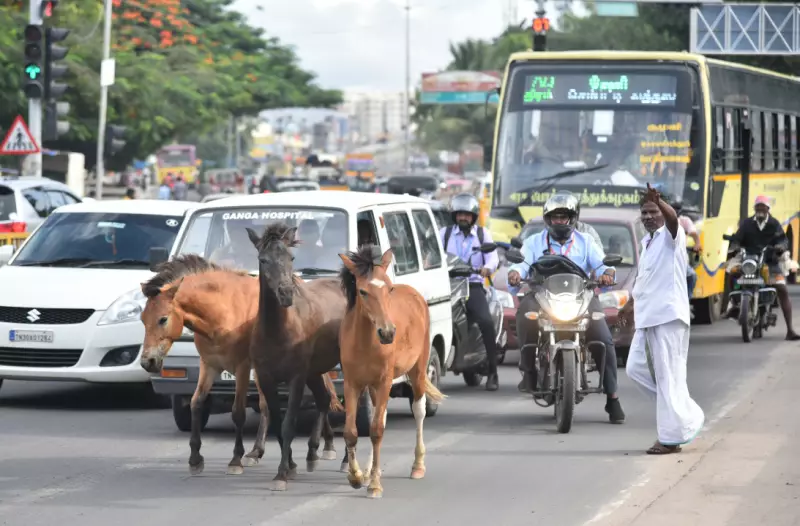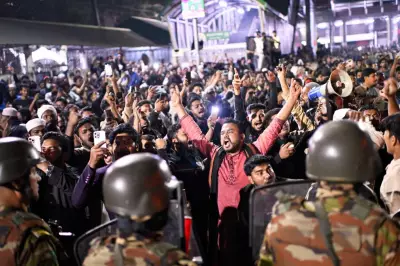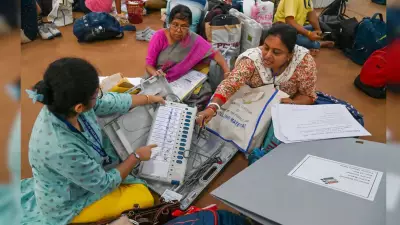
Coimbatore's Unusual Urban Menace: Stray Horses Take Over Streets
The city of Coimbatore is grappling with an unusual urban problem that has residents and motorists concerned - the increasing number of stray horses roaming freely through city streets and traffic. While stray dogs often dominate headlines across Indian cities, Coimbatore faces a different four-legged challenge that has local authorities scrambling for solutions.
More than 70 stray horses have been counted wandering through urban areas, creating hazardous situations for both pedestrians and vehicle users. The absence of standard operating procedures for capturing these animals and dedicated shelters to house them has exacerbated the situation, forcing the Coimbatore City Municipal Corporation to take urgent action.
Dangerous Encounters and Public Safety Concerns
The severity of the problem came into sharp focus on November 4 when a frightening incident highlighted the real dangers posed by these stray horses. Milk vendor P Jayabal, aged 62, was riding his motorcycle when two stray horses suddenly rammed into him.
"One bit my hand and chest, then kicked me," recalls the traumatized vendor. Despite receiving anti-rabies shots following the attack, Jayabal expresses frustration that horses continue to roam freely in the area, frequently hitting motorists without any apparent resolution in sight.
Local residents report that such encounters are becoming increasingly common, with horses often seen weaving through busy traffic, creating potentially dangerous situations during peak hours. The lack of systematic approach to handle these animals has left the public feeling vulnerable and authorities under pressure to find immediate solutions.
Abandoned and Ownerless: The Root of the Problem
According to animal rescuer K P Balakrishnan, the stray horse population primarily consists of animals that were originally purchased for racing or ceremonial purposes. When these horses are no longer useful or become financially burdensome, owners simply release them into the streets rather than providing proper care or finding alternative arrangements.
"Many are females," Balakrishnan reveals. "The biggest challenge is that no one knows who the owners are, making it impossible to hold anyone accountable for this growing problem."
Current penalties appear insufficient to deter this irresponsible behavior. While activists suggest fines of at least Rs 10,000 for abandoning horses, most owners face minimal consequences, often being let off with a mere Rs 1,000 fine when they can even be located.
Another proposed solution involves making microchipping mandatory for all horses, along with requiring owners to report new purchases and deaths to the corporation. This would create a tracking system that could help authorities identify irresponsible owners and enforce accountability.
Municipal Response and Temporary Measures
The Coimbatore City Municipal Corporation has recognized the urgency of the situation and is taking initial steps toward a permanent solution. Corporation Commissioner M Sivaguru Prabakaran acknowledges that the absence of clear guidelines has worsened the problem over time.
"We don't have designated shelters or Standard Operating Procedures yet," Prabakaran admits. "However, we're actively working with the government to create stables where these horses can be safely housed and cared for properly."
Currently, ten of the captured stray horses are being temporarily housed at VOC Park and Zoo, though this arrangement presents its own challenges. Zoo director S Saravanan explains their limitations: "We don't have trained handlers specifically for horses. Each time we need to capture one, we have to bring in external experts. Maintaining them is certainly a challenge, but we're trying our best to trace their owners and take strict action where possible."
The corporation's planned initiative includes developing proper stables and creating comprehensive SOPs for capturing, handling, and caring for stray horses. This systematic approach aims to address both the immediate safety concerns and the long-term welfare of these abandoned animals.
As Coimbatore works to balance urban development with animal welfare, the stray horse situation serves as a reminder of the complex challenges Indian cities face in managing human-animal coexistence in rapidly urbanizing environments.





